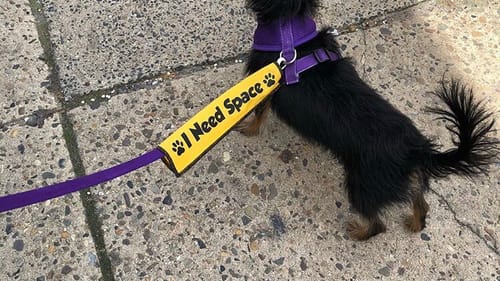Stay in the Loop
BSR publishes on a weekly schedule, with an email newsletter every Wednesday and Thursday morning. There’s no paywall, and subscribing is always free.
Woman's best friend
Four reasons getting a dog made my life better as a woman

Man’s best friend? Think again. Getting my dog, Ginny, has been one of the single best things I have done for myself as a female-identifying person in my whole life.
I thought I was getting an affectionate, furry little buddy who would rely on me for her care and cost me thousands in vet bills over the course of her life. And I was right. But what I didn’t know was that having a canine companion would affect the way I move through the world not just as a person, but as a woman.
Ginny has changed my physical, social, and emotional life in ways I bet a lot of women, non-cis men, and gender-nonconforming folks can relate to.
The exercise revolution
Especially since we live in a rowhouse without so much as a yard of yard, I knew walks would be an important part of my dog’s needs. But I didn’t expect that to affect my relationship to exercise.
I’ve hated exercise since my first days in grade-school P.E. Push-ups, soccer, trying to climb the rope: all sojourns into pain and humiliation. I was barely into my teens before I bought into diet culture quicker than I could open an issue of Seventeen magazine. Exercise was a tool to shrink and shape my body, and it didn’t matter if running laps left me retching convulsively.
But things are different with a dog. Now I take a brisk walk a few times a day, and not just because Ginny needs what one of my colleagues tactfully calls a “bio-break.” She also needs to exercise, but not to punish or change her body. She needs to stretch her legs, smell the smells, cover some ground outside.
What about me? Why doesn’t my body deserve the same benefit? As a woman, I think I could use the extra practice in trashing the notion that exercise is only worthwhile for molding my body into something more pleasing to the dominant gaze. Exercise rooted in enjoyment and wellbeing rather than body image—who knew? Thanks, Ginny.
Misgendered Ginny
Strangers assume Ginny is male. Maybe she looks like a little bearded, swaggering dude—or maybe it’s our reflexive default to maleness as a norm for dogs and everyone else. People often strike up conversation when I’m out with Ginny by asking, “Is that a boy or a girl?”
Our apparent obsession with gendering dogs is all about our own gender assumptions, of course. Constantly telling people my dog is a girl or feeling irritated when they assume she’s a boy, while silently wondering why the fuck this matters so much, is a daily reminder of the work to do in this heteronormative, binary-bound world. Who knew walking a dog could be a daily gender-studies class?

Though she be but little
Ginny weighs less than 10 pounds, but she is strikingly loud and won’t let you forget it. She sounds off at passing delivery trucks, 100-pound German shepherds, rattling carts, and even zooming Segway cops. Could I, too, subvert my nonthreatening exterior to become startlingly assertive in public spaces full of people who assume I will make myself attractive, small, quiet, and obedient? An inspiring thought.
I need space
Ginny takes the hallway like a tiny stallion when it’s time to greet me, my roommates, my partners, and close friends. She can barely reach past our knees at full stretch, begging to be lifted within licking distance. But other people? Not so much.
Ginny is so cute it’s a problem. Almost everywhere we walk, people exclaim and reach down to pet her without asking me. She shivers and cringes away from their hands.
I used to be tactful. “She’s shy,” I’d say, hoping they’d get the hint. But this doesn’t work, because most people think they’re some kind of dog whisperer who’s going to magically make your fearful dog love them. Like many women, I have a bone-deep compulsion never to offend anyone. But now I have to protect Ginny. “Don’t touch her, please,” I now say when people reach. I even bought a yellow sleeve for her leash that reads “I need space.”
Some people won’t listen. Once, holding Ginny in my kitchen, I had to repeatedly yell “Don’t touch my dog!” at a contractor who said she was cute and then reached over, ignoring me while she trembled and growled.
Encounters like this have left me raw and ruffled almost to the point of tears. I think the number of female-presenting folks who exclaim “I need one of those!” when they see Ginny’s “I need space” sign made me realize why. Watching Ginny shy away from strangers’ hands makes me flash on the helpless shudder I get when a man at a rally, party, show, or professional event touches me unnecessarily—my shoulders, my back, my waist—purposely coming in close enough to land a hand on my body.
Many women, especially those of us who are survivors of intimate-partner abuse, need all the practice we can get in rebuilding our bodily autonomy and our boundaries. My little dog should never be startled by strangers’ hands—and (until we can make a safer world at large) by standing up for her, I’m getting better at standing up for myself.
Sign up for our newsletter
All of the week's new articles, all in one place. Sign up for the free weekly BSR newsletters, and don't miss a conversation.

 Alaina Johns
Alaina Johns